(PI) Joana Lia Ferreira
PlasCO2
Green CO2 Technologies for the Conservation of Plastics in Cultural Heritage

Green CO2 Technologies for the Conservation of Plastics in Cultural Heritage
PlasCO2 is a research project (2018-2022) financed by the Portuguese Foundation for Science and Technology (FCT - Fundação para Ciência e a Tecnologia).
The project explores the use of Carbon Dioxide (CO2) - in liquid or supercritical phase - for the preservation of modern and contemporary works of art. The final aim is to design environmentally friendly cleaning and conservation protocols based on CO2 technology for plastic materials, namely Polyurethanes (PUR), foam/rubber-based materials, poly(methyl methacrylate) (PMMA) and others. Selected plastic-based works of art that have posed several conservation challenges in the past are used as case study candidates and inform the production of mock-up samples (i.e. replicas) to be used for testing the CO2 technology.
Extensive trials are performed on the mock-ups using a variety of parameters (CO2 phase and density) and conditions (pressure, temperature, use of co-solvent, exposure time). The impact and suitability of each trial on the selected materials will be assessed using different analytical techniques, to guarantee a full characterisation of the samples from the macro to the nanoscale and to outline efficient and safe cleaning/conservation protocol(s).
A Machine Learning model will be used in conjunction with the experimental work to correlate the physical and chemical properties of the selected materials, the conditions of the CO2 treatments, and the observed outcomes. Using this approach will enable to highlight the most promising and suitable CO2 conditions, which can be then further fine-tuned to meet conservation standards. Based on the Machine Learning model, a user-friendly prototype of a computational toll will also be designed, to assist conservators with the selection of the optimal CO2 treatment conditions for each specific case study.
WORKFLOW
1. Case studies selection & Replicas preparation
Objectives:
This WP involves the selection and technical examination of plastic-based work of art/objects (belonging to associated Portuguese partners) as case study candidates. The plastic materials under examination are polyurethane, other foam/rubber-based materials, poly(methyl methacrylate), and others. Based on information obtained from the technical examination of the case study candidates, a series of replicas (i.e. mock-up samples) is prepared and used to trial CO2-based conservation technology. The mock-ups are made using contemporary material equivalents, and artificially soiled and aged to mimic some of the types of dirt and degradation processes that a work of art might have endured in its lifetime. Sacrificial historical objects will also be used to further test the suitability and efficacy of the most promising CO2-based treatment conditions for plastic conservation. Historical materials include objects either bought at flea markets, antique shops or donated by the artist Lourdes Castro or by partner institutions such as NEÂds (Núcleo de Estudos Ângelo de Sousa) and Museu Benfica - Cosme Damião.
Tasks:
Task 1.1 - Selection and technical examination of historical works of art to be used as case study candidates.
Task 1.2 - Preparation of replicas (i.e. mock-up samples) using contemporary material equivalents.
Task 1.3 - Artificial ageing, and soiling, of the mock-up samples.
Task 1.4 - Acquisition of sacrificial historical objects at flea markets and antique shops, or donated by partner institutions.
2. Evaluation of CO2 based treatments
DEVELOPMENT, EVALUATION & OPTIMIZATION OF CO2-BASED TREATMENTS FOR PLASTIC OBJECTS
Objectives:
In WP2, extensive trials will be carried out on the mock-up samples using CO2 at different conditions. The CO2 technology will be tailored for either cleaning or consolidation treatments for the selected plastic materials. Samples are characterised before, after trials and over time, to evaluate the impact of CO2 on the selected plastics, and its efficacy as a conservation strategy. The assessment includes empirical observations and data collected from several analytical techniques to guarantee a full characterisation of the samples from the macroscale to the nanoscale. In particular, changes in the visual appearance of the samples (dimensions, color, gloss, surface texture), as well as modifications on their physical-chemical and mechanical properties, will be monitored.
Tasks:
Task 2.1 - Assessment of the short-long term impact of CO2 (at different conditions) on the selected plastic materials.
Task 2.2 - Evaluation of the efficacy of CO2-based treatments.
Task 2.3 - Comparison with traditional conservation treatments for plastic objects.
3. Machine Learning Models
MACHINE LEARNING MODELS FOR THE PREDICTION OF TREATMENT CONDITION & POSSIBLE OUTCOMES
Objectives:
This WP addresses the development of Machine Learning models, which will firstly help to understand the relationships between changes in the physical-chemical and mechanical properties of the selected materials and the CO2 experimental conditions used. In addition, the use of computational modelling will enable to further tailor and optimize the CO2 experimental conditions for plastic materials, as well as foresee possible outcomes. When successful predictions will be attained, the Machine Learning model will be published in the form of an Open Source software application, with the aim of assisting conservators with the selection of the optimal CO2 treatment conditions.
Tasks:
Task 3.1 - Population of a database with all the experimental data collected in WP2.
Task 3.2 - Implementation and training of Machine Learning algorithms.
Task 3.3 - Development of an Open Source software application for guiding conservators with the selection of the most suitable CO2-based treatments.
4. Dissemination
DISSEMINATION & KNOWLEDGE TRANSFER
Objectives:
This WP embraces all those activities aimed at disseminating the project's outcomes to various stakeholders and end-users (conservators/conservation scientists community; public and private conservation laboratories; museums and other cultural institutions). The activities involve the organization/participation in national and international conferences, seminars and workshops, and the management of patenting and scientific publications (Open Access).
Tasks:
Task 4.1 - Dissemination of the project results via (Open Access) publications.
Task 4.2 - Dissemination of the project results via presentation (both with a poster and/or oral presentation) at national and/or international conferences, seminars and workshops.
5. Management
PROJECT MANAGEMENT
Objectives:
This WP oversees the administration of the various work packages, budget, and time schedule.
Tasks:
Task 5.1 - Management, coordination and monitoring of the project progress, to guarantee its execution and the achievement of the milestones with high quality and efficacy in accordance with the original plan.
Task 5.2 - Financial administration (resource planning, cost estimating, budgeting and control).
THE TEAM
NOVA - Nova School of Science & Technology
Joana Lia Ferreira (PI) | Conservation Scientist
Teresa Casimiro (co-PI) | Chemical Engineer
Angelica Bartoletti | Conservation Scientist
Inês Soares | Conservation Scientist
Joana Tomás Ferreira | Master Student
Carolina Viana | Master Student
Susana França de Sá | Conservation Scientist
Sara Babo | Conservator - Restorer
Ana-Maria Ramos | Polymer Scientist
Ana Aguiar-Ricardo | Chemical Engineer
U. Porto - Faculdade de Ciências Universidade do Porto
Filipe Teixeira | Computational Chemist
Maria Natália Cordeiro | Computational Chemist
André Melo | Computational Chemist
Uinversity of Glasgow
Anita Quye | Conservation Scientist
Nationalmuseet - Nacional Museum of Denmark
Yvonne Shashoua | Conservation Scientist
CASE STUDIES
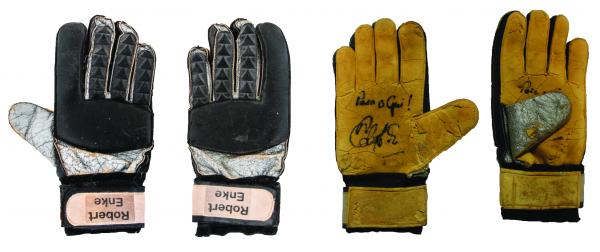
Goalkeeper gloves
Belonged to Robert Enke (1977-2009)
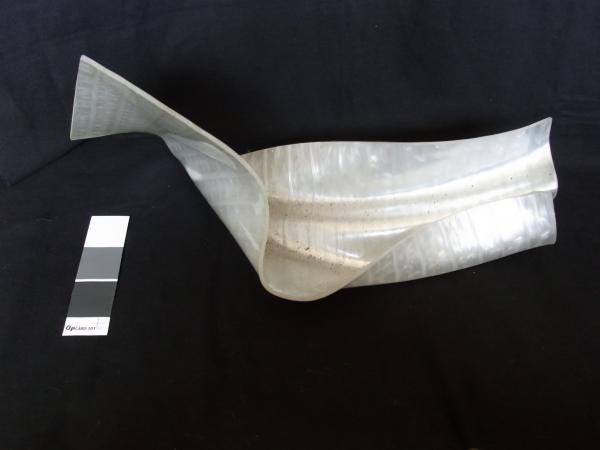
Untitled – 1966
Ângelo de Sousa (1938-2011)
PUBLICATIONS
CONFERENCES
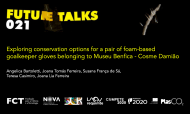
8-10 November 2021. Online Conference.
FUTURE TALKS 021. Smart solutions in the conservation of the modern.
Exploring conservation options for a pair of foam-based goalkeeper gloves belonging to Museu Benfica - Cosme Damião.
Angelica Bartoletti, Joana Tomás Ferreira, Susana França de Sá, Teresa Casimiro, Joana Lia Ferreira.
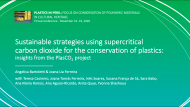
16-19 November 2020. Online Conference.
Plastic in Peril: Focus on Conservation of Polymeric Materials in Cultural Heritage.
Sustainable strategies using supercritical carbon dioxide for the conservation of plastics: insights from the PlasCO2 project.
Angelica Bartoletti & Joana Lia Ferreira with Teresa Casimiro, Joana Tomás Ferreira, Inês Soares, Susana França de Sá, Sara Babo, Ana Maria Ramos, Ana Aguiar-Ricardo, Anita Quye, Yvonne Shashoua.
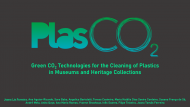
14th October 2019, Lisbon, Portugal.
Simpósio: Conservação do Património Cultural e Sustentabilidade: desafios e experiências.
PlasCO2 - Tecnologias verdes à base de CO2 para limpeza de plásticos em museus e Coleções Patrimoniais.
Joana Lia Ferreira, Ana Aguiar-Ricardo, Sara Babo, Angelica Bartoletti, Teresa Casimiro, Maria Natália Dias Soeiro Cordeiro, Susana França de Sá, André Melo, Anita Quye, Ana Maria Ramos, Yvonne Shashoua, Inês Soares, Filipe Teixeira, Joana Tomás Ferreira.
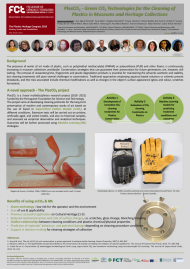
29-31 May 2019, Lisbon, Portugal.
The Plastics Heritage Congress 2019: History, Limits and Possibilities.
PlasCO2 - Green CO2 Technologies for the Cleaning of Plastics in Museums and Heritage Collections.
Joana Lia Ferreira, Ana Aguiar-Ricardo, Sara Babo, Angelica Bartoletti, Teresa Casimiro, Maria Natália Dias Soeiro Cordeiro, Susana França de Sá, André Melo, Maria João Melo, Anita Quye, Ana Maria Ramos, Yvonne Shashoua, Filipe Teixeira, Joana Tomás Ferreira.
OUTREACH
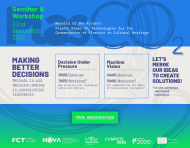
22nd of September 2022, Almada, Portugal.
PlasCO2 Seminar & Workshop | Making Better Decisions
PRESS
Joana Lia Ferreira, Assistant Professor at the Department of Conservation and Restoration of the NOVA School of Science and Technology, was interviewed by Science and Público about plastics we want to preserve.
Find out more here:
Science.org - When plastics are precious
Publico.pt - Afinal também há plasticos preciosos que queremos preservar
THESIS
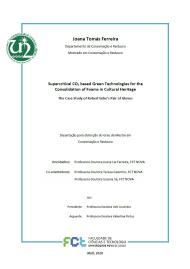
Supercritical CO2-based Green Technologies for the Consolidation of foams in Cultural Heritage. The Case Study of Robert Enke's pair of gloves.
Joana Tomás Ferreira
Master Thesis in Conservation and Restoration,
NOVA University of Lisbon, 2020.
Partners & Funding
This research was financed by Fundação para a Ciência e a Tecnologia, Ministério da Ciência, Tecnologia, e Ensino Superior (FCT/MCTES), Portugal, through the funded research project “PlasCO2—Green CO2 Technologies for the Cleaning of Plastics in Museums and Heritage Collections” (PTDC/ARTOUT/29692/2017) and the Associate Laboratory for Green Chemistry (LAQV) financed by national funds (UIDB/50006/2020 and UIDP/50006/2020)





